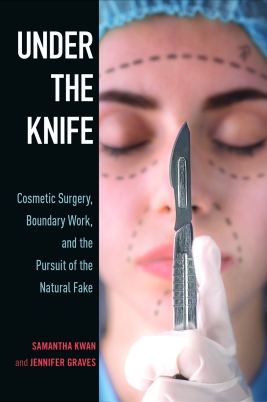This week in North Philly Notes, Jennifer Graves and Samantha Kwan, coauthors of Under the Knife, write about cosmetic surgery in the age of COVID.
Despite many states banning elective surgeries because of the COVID-19 pandemic, the cosmetic surgery industry is still booming. In fact, some cosmetic surgeons report a rise in patients amid the pandemic. This may be in part because many people are now working from home. Working from home allows people both more flexibility in scheduling procedures and the ability to work while healing. Some surgeons believe working from home has also led to an upswing in business because at-home workers have become increasingly self-conscious as they spend hours on end staring not only at their coworkers, but also at themselves, on various video call platforms like Zoom.
However, perhaps even more importantly, the ability to work from home, combined with the ubiquity of masks, has created an unprecedented chance for cosmetic surgery patients to hide their surgery. Specifically, working from home away from the prying eyes of coworkers and the opportunity to wear a mask in public allows people to conceal the fact that they have had surgery during the conspicuous post-operative healing phase. This ability to pass as surgically unaltered, we found, is paramount to those considering cosmetic surgery.
 In our interviews with 46 women who had cosmetic surgery in both Texas and California, it became clear that women who go under the knife are acutely aware of the potential stigma associated with cosmetic surgery. Specifically, they are aware that others may perceive them as fake, preoccupied with vanity, overly sexual, and more. Under the Knife: Cosmetic Surgery, Boundary Work, and the Pursuit of the Natural Fake explores the different ways women negotiate and manage this stigma.
In our interviews with 46 women who had cosmetic surgery in both Texas and California, it became clear that women who go under the knife are acutely aware of the potential stigma associated with cosmetic surgery. Specifically, they are aware that others may perceive them as fake, preoccupied with vanity, overly sexual, and more. Under the Knife: Cosmetic Surgery, Boundary Work, and the Pursuit of the Natural Fake explores the different ways women negotiate and manage this stigma.
Notably, one of the central ways women do this is by seeking out what we label the “natural fake.” Successful cosmetic surgery that embodies the natural fake means inconspicuous postoperative body parts that appear God-given. The natural fake enables women to pass as surgically unaltered while still conforming to hegemonic ideals of femininity, such as having a flat stomach, ample breasts, and a wrinkle-free face. This ability to pass as surgically unaltered, which is uniquely possible now in the age of COVID-19, helps women avoid any potential stigma they may encounter.
Alongside passing, our participants engaged in “boundary work.” For example, some defended their elective surgery as necessary, positioned their surgeries as “good surgeries” done by competent surgeons for the right reasons, and distinguished themselves from “pathological” cosmetic surgery junkies.
To expose the diverse meanings and experiences that come with cosmetic surgery, Under the Knife also explores the stories of women who exhibited a fraught relationship with cosmetic surgery. Their stories illuminate that cosmetic surgery is not always a cakewalk, and serves as a warning to those who might want to jump into surgery.
Ultimately, in addition to serving as an academic exploration of cosmetic surgery, our work serves as a resource for women contemplating surgery to help them understand the tensions associated with undergoing cosmetic surgery and the nuances of navigating the world in a post-operative body.
Filed under: american studies, cultural studies, ethics, gender studies, health, sociology, women's studies | Tagged: "natural fake", cosmetic surgery, COVID, femininity, passing, post-operative body, stigma, surgery, working from home, Zoom |




Leave a comment